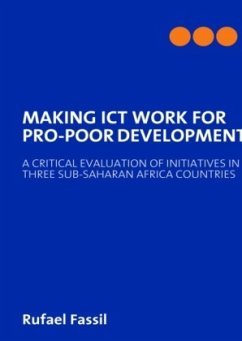This book is a revised version of a Ph.D. dissertation in which the author presents the results of a comprehensive evaluation of ICT4D initiatives in three Sub Saharan Africa countries. Its starting-point is the apparent failure of ICT4D initiatives in Sub Saharan Africa to deliver for human development goals. As a result, there has been a growing demand for more rigorous empirical evidence about the ways in which individuals and communities exploit access to and use of ICT, and the impact they have on the livelihoods of marginalized communities in rural and urban areas. The lack of empirical evidence in this area inhibits effective analysis of the factors enabling or constraining ICT4D initiatives outcomes and means that scarce development resources may be ineffectively deployed or opportunities for effective pro-poor initiatives are being missed, and it is one of the key aims of this book to explore the key critical success factors for making ICT work for pro-poor development in Sub Saharan Africa.Using a comprehensive quantitative and qualitative design, this evaluation study examined the promise of ICT to deliver for human development goals at the macro, meso and micro-level over a decade (1995-2006) in Ethiopia, Kenya and South Africa. The exploration was carried out using new hybrid evaluation framework called a Capability Oriented Logical Framework Approach (CO-LFA) that was developed by the author. This framework places, in contrast to the current discourse around the digital divide , pro-poor sustainable development and not technology at the centre of the analysis.Findings from the study clearly conform the central hypothesis that access to and use of ICT in Sub-Saharan Africa often fail to meet pro-poor development goals, because they are impaired by deficiencies in the enabling environment that are systematically embedded in the broader socio-economic context of the targeted communities. The author draws conclusions that may have implications for making ICT work for pro-poor development, in terms of assumptions, approaches and outcomes.
Hinweis: Dieser Artikel kann nur an eine deutsche Lieferadresse ausgeliefert werden.
Hinweis: Dieser Artikel kann nur an eine deutsche Lieferadresse ausgeliefert werden.








